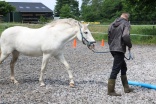Home › magazine › september 2017 › latest news › Horses for courses...
Horses for courses...
5th of October 2016ECJ editor Michelle Marshall visits building services provider Facilicom, which has its headquarters in the Netherlands. The company has identified the advantages of incorporating horses into its management training, with great success.
As the building services market develops across Europe and clients have changing expectations, so the providers of those services are obliged to adapt to a new way of working. Fundamental to future success, says Facilicom, is quality of management personnel. That’s why the contract cleaning and soft services provider, based in the Netherlands with branches in Belgium, France and the UK employing 28,000 people, has radically altered its management training programme.
Jacobien van Wittmarschen, human resources development manager, explains the background. “Changes in the market have led to customers expecting us to adapt more to their needs. They want us to advise them rather than just provide a service.
“Contracts are also becoming much more results-oriented. The fact we are experienced in cleaning is now assumed so the client expects us to work more towards achieving overall satisfaction for that building user.”
This has led to changes for the cleaners and how they operate, van Wittmarschen continues. “They must be more independent, they must be able to talk to customers, etc. They have to be proactive in their service on contracts. This, we have discovered, requires a different
style of leadership.”
For Facilicom this transition necessitated a significant change in culture. “We were competent in terms of operational excellence,” explains van Wittmarschen, “but we have very high-end clients and they expect more innovation. We must introduce new ideas. “Customers also want more service at a lower cost – that means better educated cleaners who work smarter.”
Facilicom expects its teams to solve problems themselves on-site, so they must be taught how to work as a team. Consequently, personnel at management level must now be leaders and facilitators.
This is where the horses come in. It is widely recognised that working with horses is a successful and practical way to understand what it takes to be a good leader, through hands-on experience. Facilicom identifies its management candidates with the highest potential and puts them in a situation where they work together with the horses and then transfer the skills they learn into their managerial life.
Constructive learning
There are many benefits of working with horses. They are non-judgmental so everyone can learn constructively from their mistakes. They give an immediate response so you get instant and honest feedback – they don’t discriminate if you are the ceo or a secretary. They respond to non-verbal communication, enabling managers to learn to make their message clear through movement and posture. And they reward your efforts once you have earned your authority, which encourages leadership through respect and trust rather than power.
So Jacobien van Wittmarschen developed exercises with psychologist Tenne von Nordheim, at whose farm near Zwolle the Facilicom managers attend their training courses. Von Nordheim is experienced in professional training and coaching so was an ideal partner.
The managers work in small groups and spend a day with the horses working through a series of exercises. This ranges from guiding them on a rope, leading them around obstacles, getting the horse to run around a paddock while they stand in the centre and prompting them when to slow down through movement and posture. Sometimes the manager works alone with the horse, other exercises require them to work in pairs or as a small team.
“We have found this method to be particularly useful in seeking feedback,” continues van Wittmarschen. “As human beings this is difficult for us because we are naturally defensive and feedback can be seen as criticism. However we have found our managers accept feedback from horses more readily than from people.
“With the horses we are providing a safe environment where our managers can experiment with new behaviour. This is vital because we need this type of higher ranking people in our organisation.”
Implement small changes
Van Wittmarschen observes how each manager interacts with the horses then transfers her findings into work practices. She visits them in their workplace, with their team, to implement small changes.
“For example, we had a manager who was keeping the rein on the horse very short even though the horse could act alone,” she continues. “That could signify he perhaps needs to give more ‘rein’, more freedom, to his managers, because they’re perfectly capable.”
She also meets with the team reporting directly to each manager to see what their tasks are. “We work on developing the team’s trust in their manager, and the manager’s trust in them.”
Step by step the managers are led to new behaviours by van Wittmarschen. “When I can show them that working in this way costs less time, we find the manager feels more independent and enjoys his work more,” she explains.
For Facilicom this investment in senior management is high but crucial to its success. “It is essential to spend a great deal of time with our managers because it takes high-ranking people a long time – at least three months – to learn new behaviour,” she adds.
Tenne von Nordheim and her horses show the managers the potential for learning, then van Wittmarschen is responsible for leading them to transfer what they have discovered to their daily life.
And the results speak for themselves. “What we have witnessed is that managers being trained using more conventional coaching techniques were not able to make significant changes,” van Wittmarschen explains. “When we gave them some time with the horses, they could really take significant steps forward.
“This is more important with managers who have a great deal of experience than with young potential leaders,” she continues, “because the young managers are easier to ‘shape’.”
Embedded behaviour
“More experienced behaviour becomes embedded and we need to understand why that behaviour has developed,” adds von Nordheim, “and how changes to that behaviour can result in a different way of doing things. This is apparent very quickly when working with horses and it shows managers there is a different way.”
For Facilicom, it is absolutely crucial to have the right calibre of people in its management team. “Our managers must realise and accept the need for change and adapt accordingly,” says van Wittmarschen. “We are offering them a bigger toolbox to use wider behaviours, we are not asking them to become a different person.”
And Tenne von Nordheim supports the business’ policy, adding: “Facilicom is very proactive in exploring what their people need, now and in the future. There is a strong culture of continuous improvement.”
“If our management want to stay aboard and stay relevant they must engage in this type of training,” concludes Jacobien van Wittmarschen. “Being able to adapt is crucial. Our managers have to become more like business consultants, and they must have a different relationship with their clients than they did before.”











